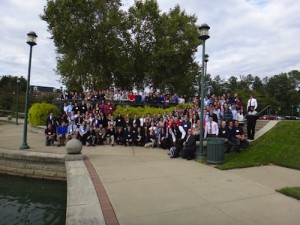… you have to speak in a foreign language with someone who doesn’t speak English.
by Ben LaBouve, French tutor
Q: What is the most nerve wracking experience for anyone who studies a foreign language?
A: That moment you are faced with a native speaker and the pressure to speak elegantly and articulate is too much!
Studying foreign language in an academic setting is often vastly different than applying those skills in the real world. Sometimes you get so used to hearing and understanding a professor’s particular accent that you watch a movie in your language and realize you don’t understand anything! Even taking a class with a new professor, having to adjust to their speaking pattern and intonation, results in a sort of dizzying, linguistic vertigo. And let’s face it, while participating in class discussion, I am very guilty of using the same verbal structures over and over to get my point across. Just when you start to feel confident over your mastery of a language, it only takes one encounter with a native speaker to make you realize how much you still have to learn.
Depending on how closely you follow the CWLT blog, you should already be familiar with my extracurricular work with immigrants in the community. There is a lot of opportunity for me to interpret for Spanish-speaking clients but rarely is there ever a need for French language work. Coming out of class the other day, I received a call from work asking if I could come immediately and interpret for one of our clients. I obliged and went in! On the drive over, I started going over different sentence structures and specific vocab in Spanish that I knew I would need going in. However, I was met with a pleasant surprise! Today, I would be helping a woman from Haiti. Given the statistics of Spanish-speakers in the community versus the French-speaking, both of us were surprised that we could communicate using a mutual language.
After immediately freaking out (I have never interpreted actively in French before! Nor do I even know how to explain the specifics of social support programs, in English nonetheless!), I greeted her and could immediately tell how happy she was to be using her native tongue. After a few awkward flubs on my part, (the word for ‘March’ and ‘Mars’ are both ‘mars’ in French, No Madame, your appointment is not on Mars!! Darn prepositions!!), our dialogue flowed more naturally towards conversation. She reflected on her difficulty in speaking English: “I can read and write, but speaking is always what is most difficult.” We had a great laugh over this one as I explained that I was in the exact same situation as her, having to rely only on my speaking skills was extremely nerve-wracking for me, as my increasingly red face demonstrated. She also told me how her daughter would tease her that she really didn’t speak English, but only recognized the cognates and other phrases that English has appropriated from French.
Nothing could be truer. When we learn another language, we automatically flock to similarities as a way to compensate for our limited expression. Given that English and the romance languages are rooted in Latin, there are many words that can be easily converted across and many that are just cultural (l’amour is always love, fiesta is always party!). The only way to get past the language barrier is to take a deep breath, acknowledge that perfection is overrated and use it as an opportunity to learn. Get ready for a lot of correction! When you meet someone who speaks a different language, they will always be happy to speak to you because you are making an active effort to use their language and engage with their culture. A lot of the time, they will rely on you for the same reason. The chances are that they are just as anxious to use what they have learned as well. I believe that language only works with collaboration; through communicating with others, we essentially revolve the everyday world. Once you get past the initial language shock, your conversation will be fun and effortless. And the best part: you get a sense of validation that you’re not as awful as you think you are.

![image[1]](http://blogs.pugetsound.edu/cwlt/files/2014/02/image1-300x300.jpg)
